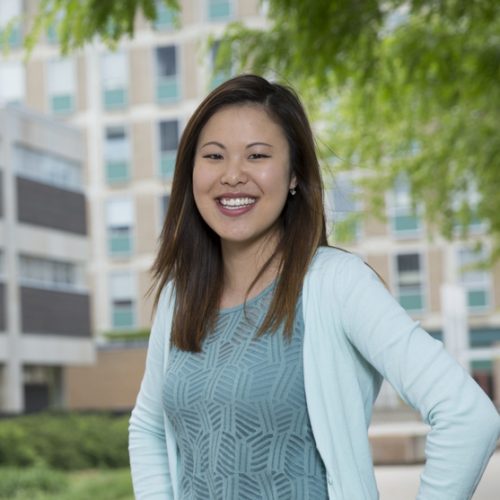Christine Le

Christine Le
Alumna, PhD (2017), Chemistry
“The research conducted at U of T is high impact and can be directly applied to current world issues.”
I was raised by a single mother who immigrated to Canada so that her three children could have better opportunities. Coming from a first-generation family, I was the first person to graduate from university. I completed my undergraduate degree in chemistry at Western University in 2011, graduating with distinction at the top of my class.
I am a third-year PhD candidate in the chemistry laboratory of Prof. Mark Lautens. We are mainly interested in developing reactions that can be applied to the synthesis of drugs in the pharmaceutical industry to recreate naturally occurring molecules that have known medical applications, and to create new molecules that can be tested for better medicinal properties. My area of research is concerned with making these molecules in a way that is environmentally sustainable.
As a graduate student, I want to do research that could potentially have a direct impact on the betterment of society and human health. The University of Toronto is a perfect fit. It is a world-renowned university and is considered one of the top research institutions in Canada. The research conducted at U of T is high impact and can be directly applied to current world issues. I feel privileged to use the most advanced, top-of-the-line instruments on a daily basis.
If I were to describe my U of T experience to prospective students, I would tell them that the University provides an incredible number of resources to support students, and that they can expect to learn much more than they imagined.
In fact, some of my most remarkable experiences have been outside of the lab. For example, the Department of Chemistry hosts special weekly seminars given by renowned academics and scholars. These seminars provide an opportunity for students to learn about the research of other groups in an intimate setting and to network with the visiting professor.
During my PhD, my department has supported me in several respects. It has provided me with travel grants to attend conferences, teaching grants to carry out pedagogical projects, and start-up funds to build new student clubs. All these factors have contributed to an enriching graduate school experience.
In my second year of graduate studies, I was one of five Canadians sponsored by the Natural Sciences and Engineering Research Council of Canada (NSERC) to attend the 63rd Lindau Nobel Laureate Meeting in Germany. At this meeting, 34 Nobel Prize Winners in Chemistry participated in seminars and discussion panels. Over 600 students, representing 78 countries, attended the conference. Besides learning about current research in chemistry, there were many opportunities to discuss important science topics, such as global warming, antibiotic resistance, and the role of scientists in public policy. I was able to network with scientists, making this conference one of my most memorable experiences.
I’ve also made use of resources outside of the department. Almost all graduate students in my program are expected to hold a teaching assistantship. Coming from a university where I had little experience mentoring younger students, I needed guidance. Through the Teaching Assistants’ Training Program (TATP), I learned to become a more effective TA, to hone teaching skills, and to develop a personal teaching philosophy. Overall, the TATP has been an invaluable campus resource.
I would advise prospective students that graduate school is very different from their undergraduate experience: you spend less time in class and more time doing research. For this reason, you must be very passionate about your studies, so that when you encounter a problem, you are motivated to continue working. One of the important lessons I learned is that for every finding you make, whether expected or unexpected, positive or negative, there is an opportunity to learn and grow.
Christine was a recipient of an Ontario Graduate Scholarship and named to Forbes’ 30 Under 30 list in the science and health category in 2015.
